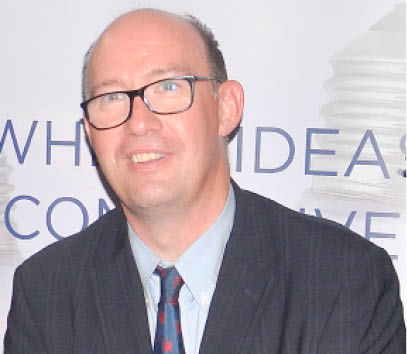Chevening Scholarship is one of the prestigious programmes that open doors for Nigerian graduates to study for one-year master’s degrees in UK universities. British Deputy High Commissioner, Ben Llewellyn-Jones, who recently hosted successful candidates of the 2020 cycle to a pre-departure reception at his residence in Ikoyi, said the UK government is happy to invest in education as Nigerian graduates are academically gifted and ambitious.
Why is the UK government investing in Nigerians?
We have a long-standing partnership between Nigeria and the UK and our investment in education is a really big part of that. There are so many Nigerians who want to study in the UK. Achieving scholarships is a big part of us helping Nigerians to go to the UK to study and then come back and give back their time and invest their skills in Nigeria. We hope that by this contribution, we can advance Nigeria and develop that really strong bond. It is really exciting listening to the stories of people going to study in Leeds, Manchester and Scotland. It is really exciting to hear their thoughts, visions and ambitions. It is really good to be a part of that.
How impactful has the programme been on both the UK and Nigerian governments?
It has been incredibly impactful. We’ve got over 1500 Nigerians who are beneficiaries of this scholarship from all disciplines and they go on to be captains of industries, inspirational figures in the civil societies and really inspire and encourage and mentor other Nigerians to come with them. Importantly, they have a really strong attachment to the UK and a good understanding of the UK and network, which helps to bring expertise from the UK; and from Nigeria to the UK as well. It is always great when I meet Nigerians and they say, ‘I am a Chevening scholar or I know a Chevening scholar.’
How are you able to go through the screening to select the best?
We have a very thorough process. We had 8000 applications this year, 7000 which were eligible to apply and we screened them on paper and I interviewed some myself. We are really thorough about it and we look not only at the academics but also the human side of it: the people, the stories, the aspirations, the ambition – what they want to do with the scholarship, what they want to do when they come back. That is a really big part for us as to what the scholarship is. It’s not just about the academics, it’s about the person. We narrowed it down to 50 people from 7000, these guys are amazing. The real cream of the crop from Nigeria. They’ll go to the UK; they’ll come back and give back to Nigeria. One day, they’ll be running top offices and running things for Nigeria. That is just the small thing we can do but we hope to make a difference.
You have been part of the assessment process, what will be your assessment of an average Nigerian graduate?
What you find here is that academically, they are very gifted but they are also very driven. They have huge ambitions, they are very enthusiastic about what they are trying to do and if they get to that point of an interview, they have put themselves, their thoughts and desire into it. You come across passionate, committed, talented, creative and resilient people and I think their enthusiasm is brilliant. You come out of the interviews inspired by what they want to do.
What is your advice for those who were not picked this year and those that are going to apply next year?
For anyone who applied this year and couldn’t make it, apply again I will say because there are huge opportunities this scholarship gives. For those going, it is about the academic experience but it is also about the experience of living in the UK, the people you meet, the places you visit, the network you get access to. That is a huge part of the scholarship. You come back with a scholarship which is great but you also come back with a network which is equally good.

 Join Daily Trust WhatsApp Community For Quick Access To News and Happenings Around You.
Join Daily Trust WhatsApp Community For Quick Access To News and Happenings Around You.


